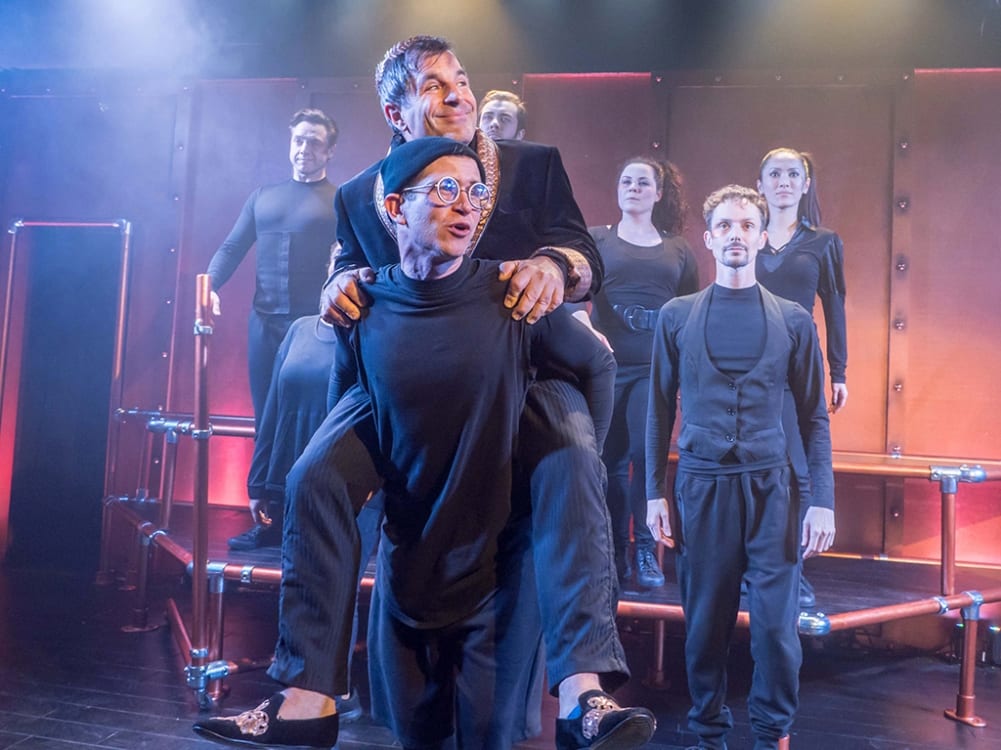I love this show. I can’t deny it. Not just because it sounds far bigger than the tiny space it’s now inhabiting (thanks to Tim Sutton’s new orchestral reduction), or the fact that every square foot of the dish-cloth sized stage is used to great effect by Tim McArthur’s energetic and inventive choreography. No, the reason I love this show is because intellectually it is the most optimistic and hopeful show currently playing in the West End (or just off it…).
Cast your mind back to 405 BC. Athens had been fighting Sparta for thirty long years, the great Athenian tragedian Euripedes hadn’t yet been dead for twelve months, and more importantly for our purposes the big hit of the Lenaia, one of the festivals of Dionysus held in Athens, was Aristophanes’ new play, The Frogs.
In fact, the comedy – though possibly not to modern tastes – was so successful that it was performed again the following year thus becoming, in all probability, the world’s first theatrical revival.
Fast forward to the 1970’s, and Burt Shevelove approached Stephen Sondheim, with whom he has previously worked along with Larry Gelbart on the 1962 hit Broadway musical A Funny Thing Happened on the Way to the Forum (taking inspiration from the works of the Roman playwright Plautus). However, rather than the farce of Forum, The Frogs asks the timeless question ‘Can you change a corrupt and badly governed world for the better through the transformative power of art?’
Sondheim wrote an introduction, and some chorus pieces, and the show had its debut in 1974 in Yale University’s gymnasium’s swimming pool and, given a synchronicity of timing, was performed against the backdrop of Watergate.
Some years later the actor Nathan Lane gave a concert performance of the piece, and following on from that came up with the idea of working it up into a more traditional Broadway show. He re-wrote and re-shaped Shevelove’s book, and prevailed upon Stephen Sondheim to write an additional seven musical numbers. It is this version which has just opened at The Jermyn Street Theatre.
The (demi) god of both the theatre and of wine, Dionysos (the always marvellous Michael Matus), fed up with the ineptitude and bad governance of Athens, decides he will journey down across the river Styx to the underworld along with his slave Xanthias (George Rae) in order to bring back a writer who can, through his work, stir society from the torpor of conservatism in which it finds itself.
Wishing to travel in disguise he visits his half-brother Herakles (Chris McGuigan who is both butch as Herakles, and disarmingly feminine elsewhere is some wonderful gender-blind casting) before making his way down to the Styx where he must negotiate the boatman, Charon (Jonathan Wadey, with all the wonderful stoner madness of a young Jack Nicholson), and encounters the frogs of the title who take him captive.
Regaining his freedom after the interval, he travels further on to Hades where he encounters Pluto (more fine gender-blind casting, the coquettish Emma Ralston cast from the same mould as the Killer Queen from We Will Rock You), and eventually George Bernard Shaw (Martin Dickinson) whom he decided to test in a battle of wits with Shakespeare (the choristically clear-of-tone Nigel Pilkington).
Having originally thought to be taking back a playwright, Dionysos changes his mind, and decides what the world needs is a poet, so settles on taking back Shakespeare to teach the world how it should be seeing itself.
There are a couple of numbers which have already found a place in the canon. The ‘Invocation and Instructions to the Audience’ appears in many a Sondheim anthology, as does the catchy ‘I Love to Travel’, but there’s plenty more to love here too.
So, is art a force for change? Can one little show in a basement theatre bring about transformation in the world? Well, every revolution has to start somewhere, and this would be a very good place to start.




